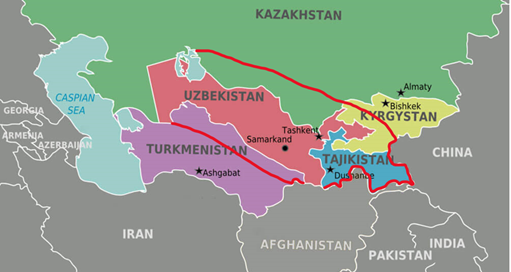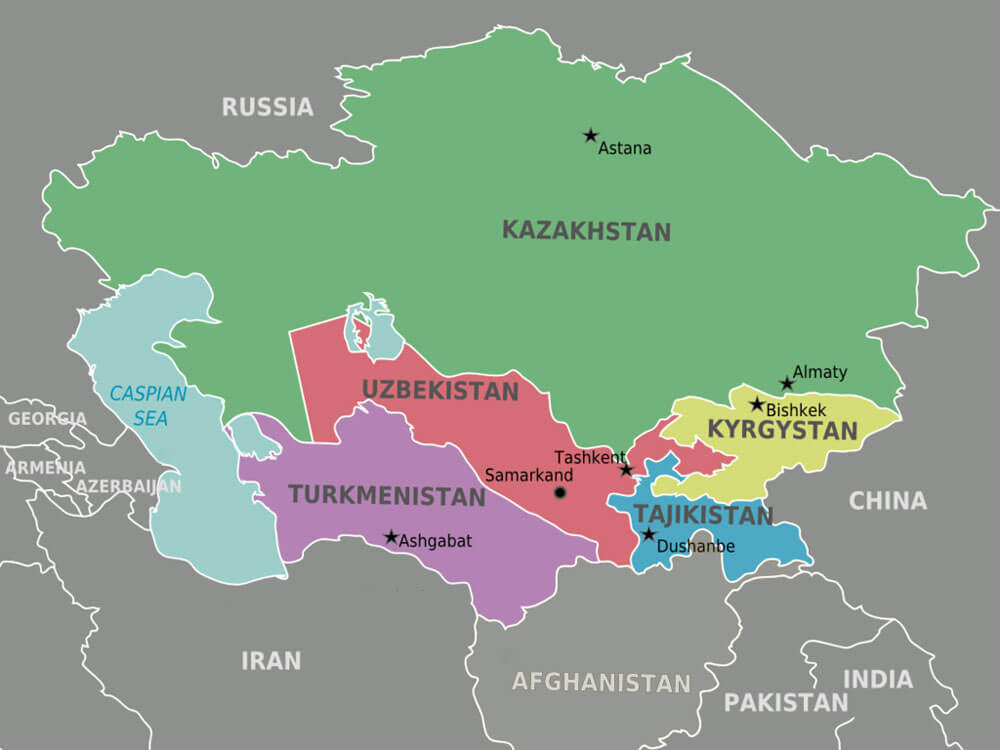As described in Part 1, Uzbekistan is a country that had its chance at development crippled by geopolitics. Russia has meddled in this part of the world for decades. With the Ukraine war consuming more and more Russian resources, opportunities are being created for countries to pursue their own sovereign interests without the fear of Russia gatecrashing the party.
With pre-drinks wrapping up, Uzbekistan is on the verge of heading into town to get the party in Central Asia started. The five Stans in Central Asia are about to get shaken up.
The Geopolitical Tale of the Tape:
Population-wise, there are more Uzbeks than all of Kazakhs, Kyrgyz, Tajiks and Turkmen, combined. In many aspects of like, especially conflict - size matters.
Uzbekistan is widely self-sufficient in natural gas, oil and grains. The same cannot be said for any of the other Stans. External sanctions or reprisals are of little deterrence for the Uzbeks.
Uzbekistan has quite the robust and diverse economy, even being one of the few countries that managed to score positive GDP growth in 2020. View this as a healthy training camp the Uzbeks are progressing through, placing them in a good position to make a move towards the mid-late ‘20s.
For each opponent of Uzbekistan, see below.
Turkmenistan
Turkmenistan is a country that feeds off the open wound that the Soviets cut into Central Asia; the Karakum Canal. The majority of the ethnic Turkmen live along this artificial waterway. It would only take the Uzbeks a long weekend to travel the short distance into Turkmen territory to apply the tourniquet to the canal to stop the wasteful flow into their desert once and for all. Turkmenistan will then revert back to small individual oasis towns lacking any sense of sovereignty. Turkmenistan will be in no position to resist or counter a swift severing of their lifeline by the Uzbeks. They will have more to worry about Islamic extremists from neighbouring Afghanistan and Iran, that will be licking their lips at moving into their unprotected territory as far as Uzbekistan allows them.
Kazakhstan
As the 9th largest country in the world, Kazakhstan has one of the lowest population densities in the world. There is almost 1,000km between the Kazakh capital, Almaty, and the Syr river. Uzbekistan’s capital Tashkent overlooks this river from the high ground. With water security as the principal motivation for the Uzbeks, the Kazakhs are already on the backfoot in countering any challenge from this direction. This approach also doubles up as achieving strategic depth around the Uzbek capital of Tashkent. Currently the Kazakh border backs up onto Tashkent’s toes. Pushing this back will provide additional security around the Uzbek economic and political core. The timing of such a move on this territory will be the most delicate for Uzbekistan’s ambitions. Kazakhstan is effectively a puppet state of Russia meaning the Kazakh power is correlated to Russia’s. As Russia goes all-in on the Ukraine invasion and over-commits resources to the war effort, their ability to support and protect Kazakhstan will diminish. While this is likely the most capable and formidable opponent Uzbekistan will face, it is still low-hanging fruit to secure additional long sections of the Syr river, or indeed all of the river, from Kazakh control.
Tajikistan
This country is lucky to be on the list because it barely even qualifies as a functioning country. Tajikistan’s state lines were woven into the mountains of the Fergana Valley by the Soviets in order to dissect and split up the powers of the region. In doing so, Tajikistan’s northern head sticks out like a sore thumb into Uzbekistan’s territory and is populated mainly by Uzbek people. With most of the region’s road and rail infrastructure in this patch, Uzbekistan will have this region towards the top of their Santa List. As for the rest of Tajikistan, the main river that supplies Uzbekistan, the Amu Darya, originates from this region. With numerous hydroelectric dams built in the area that can control its flow, Uzbekistan will need to get control of the taps. Similar to having a pop at the Kazakhs, timing here is also key. There is an estimated 7,000 Russian troops providing “security assistance” to Tajikistan. In my recent article, “Future Flashpoint: Armenia & Azerbaijan”, I discussed the patience Azerbaijan must have in order to wait out the Russian support for Armenia so they can get their hands on Nagorno-Karabakh. The Uzbeks will be keeping a close eye on Azerbaijan’s approach and success here as their own approach will be from the same play book.
Kyrgyzstan
The Kyrgyz are a mountain people that live in the highlands of the Fergana Valley. Similar to how Tajikistan sits on the source of the Amu river, Kyrgyzstan sits on the source of the Syr river along with several hydroelectric facilities. Securing control of such resources will be the aim for Uzbekistan, however they will have to be slightly more careful as to how they go about it. Neighbouring Kazakhstan’s largest city Almaty is right on the border of Kyrgyzstan, being less than a 4 hour drive from Kyrgyzstan’s own capital Bishkek. For the Uzbeks to push too far into Kyrgyz’ territory could unsettle the Kazakhs sleeping in their beds down the road. Wary of the support that could pour in from Kazakhstan to rebalance the scales in the region, Uzbekistan need to be wise to not bite off more than they can chew. The southern half of Kyrgyzstan sounds about right for Uzbekistan’s goals.
Afghanistan
For the sake of completeness, seeing as it is the last country to share a border with Uzbekistan, I will include Afghanistan. The country is currently being run by the Taliban - a bunch of inept, backwards thinking stooges. On Uzbekistan’s border with Afghanistan there is only one bridge that crosses the Amu river which separates Afghanistan and Uzbekistan. This is already firmly under Uzbek control.
From the Taliban’s point of view, they naturally do not have a dog in this fight. If they wanted to get involved, there are easier pickings for robbing and pillaging in places like Turkmenistan after the Uzbeks dry them out, rather than going up against the powerful Uzbeks themselves. Either way, whichever adventure takes their fancy, the Taliban’s military doctrine will need to be expanded beyond pedal boats before they are of any concern to the Uzbeks.
All told, Geopolitical Irish Lad’s prediction of how this expansion will look is the following:
The geopolitical stage is set for Uzbekistan’s domination of central-Central-Asia. As outlined, there is very little the bordering countries of Uzbekistan can do to halt this expansion or indeed prevent it, other than hoping for the best.
The Western world’s appetite, particularly America’s, for getting involved in anything that ends with a “Stan” is extremely limited. America got their fingers burnt a few times too many in this part of the world. Only 2 years ago in summer 2021, America fully withdrew from Afghanistan in dramatic fashion. The international condemnation that followed such a messy and hastily exit was a lesson for any world leader to not get involved. Central Asia has its own ecosystem with values and cultures few in the Western world understand. The risks/rewards of a military adventure in this part of the world is heavily weighted to the downside.
With the world’s policeman, the US, not interested - who else cares?
China is a stone’s throw from where all the action will be happening. However, this is one heck of a stone’s throw with an entire mountain range and two deserts (Taklamakan and Gobi) to clear before arriving into developed China. This geographical barrier puts a firm wedge between the interest and effectiveness of China getting involved. With an conflict, it is inevitable there will be a flood of migrants fleeing for safer pastures. For people in Kyrgyzstan and Tajikistan, the options of where to go are limited. Kazakhstan to the north for these people will have limited capacity to help as they will have their own worries about combating a Uzbek invasion. Fleeing south into Afghanistan into the hands of the Taliban, needless to say, would be shite craic. This leaves people the option of fleeing east, into China.
Even if a migrant was successful in simply getting into China after descending from the mountains, this area of China has very little infrastructure for easy transport. Migrants would have to tackle this perilous journey on foot, skirting around the edge of the Himalayan mountain range.
What happens if you want to stop off at a Chinese bed & breakfast along your way? “No problem”, says China, “help yourself to one of our many concentration camps in the area”. This area of China is the infamous Xinjiang region which notoriously hold China’s concentration camps for the forced labour of the Uighurs.
“Out of the frying pan and into the oven” accurately sums up the situation for the potential migrants.
This leaves us with Russia.
From once controlling the entirety of this region from Moscow, a stunning reversal is afoot. Russia has always been nervous of a regional power consolidating control over what Moscow views as their back-garden. As described in my Part 1, Russia transformed this region for better and for worse (mainly worse). The one country that got the lion’s share of the worst has been Uzbekistan. Half of their country is a write-off due to a Soviet-manufactured ecological disaster. The horrors and damage inflicted on their country is fresh in the mind of the young, up-and-coming Uzbeks. They have patiently waited on the sidelines for their master to become old and distracted. Putin launching his reckless war on Ukraine has provided this opportunity. The Russian’s capacity to maintain control and power through their military beyond its borders is rapidly dwindling.
With no country willing or able to stand up to a Uzbek water-driven invasion, all that remains is the will of the local people to speak up and prevent such a calamity. Sadly, the Uzbek government are one of the most brutal regimes in the world. Their leaders clearly have a sadistic “thing” for water. Local dissidents that are caught are held in specially designed, extremely cold torture cells, where guards repeatedly pour freezing water on the floor. If dissidents continue to be cheeky, they face being boiled alive. Gulp.
Russia going all-in on the Ukraine invasion has spun the geopolitical chessboard on its head. The changing of the guard will create opportunities for countries that have been afraid or held back from chasing their own patriotic objectives. Uzbekistan is primed for this opportunity. And as horrible and terrible a country Uzbekistan is, it is certainly the best of a bad lot.
For now, and for the foreseeable, that’s all that matters.








Thanks for the fascinating article.
Best wishes from Australia.